27 November 2017 Edition
Deliberate British policy dictated brutality and medical neglect of POWs
Independent Tribunal on Prison Protests 1976-1981 in H-Blocks and Armagh
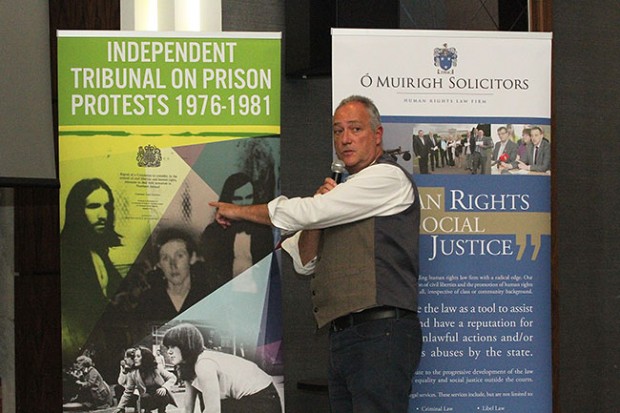
• Séanna Walsh outlines the work of the tribunal
THE HARROWING TREATMENT of protesting republican POWs in the H-Blocks of Long Kesh and Armagh women’s prison was laid bare to an audience of republicans in Belfast on Friday 6 October as the initial findings of the Independent Tribunal on Prison Protests 1976-1981 were made public.
Not only has the tribunal revealed that prison warders were involved in systematic violence against the prisoners but that their actions were sanctioned at the highest level of the British Government’s Northern Ireland Office and the prison regime and that, under instructions from the Prison Service, prisoners were to be deprived of medical treatment.
The tribunal paid particular attention to the ‘mirror search’ which was introduced at the height of the ‘No-Wash’ protest in late 1978 to replace the so-called ‘table search’. Used to carry out anal searches, the procedure was described by clinical psychiatrist Dr Oscar Daly as “akin to rape”.
An NIO document, sent by a J. P. Irvine to then British Secretary of State Roy Mason in January 1978 as the prison protests were escalating was published as part of the report. It states: “Something should be done to put more pressure on the protesters to abandon their protest.”
Other documents reveal how the NIO was aware of a threatening approach to republicans among prison officers, with one boasting that they had adopted a “We are the masters now attitude”.
Official culpability
The evening centred on a series video interviews from former POWs detailing their treatment while on protest for political status as well as a slide show detailing British Government, NIO and Prison Service documents exposing official culpability for the treatment of the prisoners.
Speaking at the event, Séanna Walsh of Coiste na nIarchimí, the republican ex-prisoners’ organisation behind the initiative, paid tribute to the many ex-prisoners who overcame their own extremely trying and emotional difficulties and testified to the panel of international jurors who oversaw the process of evidence gathering.
Walsh paid tribute to the late Peggy Friel of north Belfast, who died from cancer in December 2016 just months after recording her testimony.
Walsh also praised the role of the late Warren Allmand, a former Canadian Solicitor General who chaired the hearings and who, by sad coincidence, who also died in December 2016.
A legal mind with a reputation for defending human rights, Allmand visited the North on many occasions, witnessing the brutality of the Orange state on the Garvaghy Road and Ormeau Road during the unionist marching season in the late 1990s.
“His contribution to not only this tribunal but to human rights internationally has been invaluable,” Séanna Walsh said.
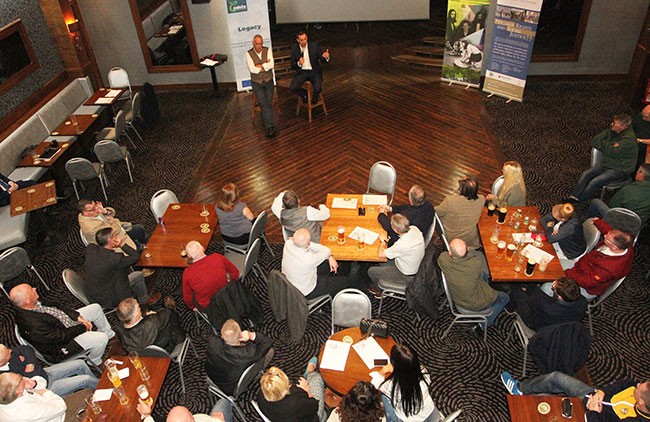
• A section of the crowd
Gratuitous brutality
Despite the fact that many of those in the audience had, while in the H-Blocks and Armagh women’s prison experienced the brutality of the prison regime first-hand, they were still shocked at the accounts of gratuitous violence and emotional distress of the witnesses whose testimony was broadcast.
Among those was Belfast man Seamus Kearney’s graphic description of the ‘table search’ he was subjected to in 1978, just months into the ‘No Wash’ protest when the ‘Blanketmen’ escalated their protest for the restoration of political status.
Clearly distressed when testifying, Kearney relived what can only be described as a vicious sexual assault during a ‘table search’.
Kearney told An Phoblacht of the horror he was faced with a group of six warders and was ordered to “Get on to that table, you whore!”
He refused and the search squad forced the struggling, naked man onto the table and pinned him down, arms akimbo. They then prised his legs apart to allow a so-called medical officer carry out an ‘internal examination’.
“You’ll enjoy this, Kearney,” said the ‘medic’ as he inserted his gloved fingers into the prone man’s anus.
The west Belfast man recalled how he said to himself: “I will never surrender to you!”
Contrary to NIO claims that “when a prisoner is searched only an external visual examination of the rectum is made by prison officers using a floor mirror”, the tribunal found that “not only did prison officers perform extremely intrusive cavity searches, these searches invariably led to further physical abuse inflicted on the prisoner”.
Likewise, Peggy Friel and a number of other protesting women prisoners recounted their experiences of searches that were clearly designed to humiliate.
One woman prisoner complained about an “obtrusive search” and outlined how she was physically hurt by a prison officer who “groped” between her legs under her underclothes, causing such distress that she “burst into tears and wept for ten minutes afterwards”.
Clearly the body of evidence that is emerging from the initial findings of the tribunal and the witness evidence of male and female prisoners is that this type of intrusive search had a sexual element to it with
Anne Marie Quinn described how she was beaten by male prison officers who were drafted into Armagh Prison. While being lifted and dragged from the canteen, she said she was dropped on a flight of stairs and had her head deliberately bumped on each one as she was pulled along by the ankles.
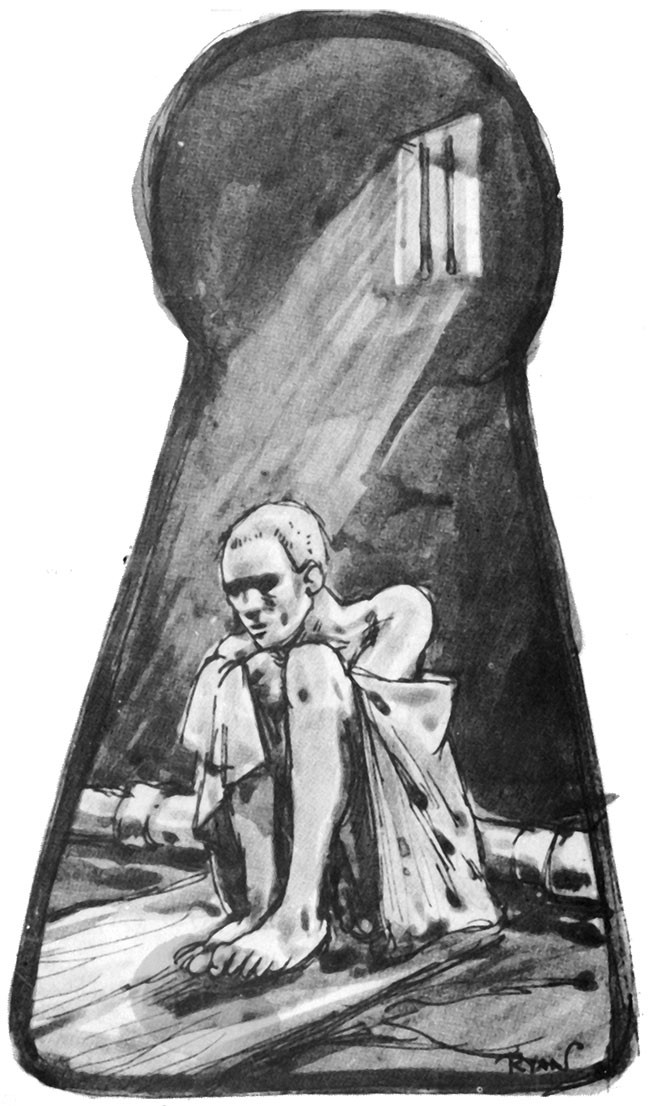
Amnesty: ‘cruel, inhuman’
While the focus of the physical violence inflicted on the prisoners, particularly with the escalation of the ‘No-Wash Protest’, is paramount, the tribunal also delved into the violations of Article 3 of the European Court of Human Rights.
The regime imposed on the protesting prisoners was designed to break them physically and mentally.
In a letter written before the ‘No-Wash’ protest began to Secretary of State Roy Mason, Amnesty International’s General Secretary said:
“If the allegations as to the deprivation of exercise, of reading materials, of suffering a ‘restricted diet’, a refusal to allow for slopping out and the removal of bedding during the day were to be confirmed then it would amount to cruel, inhuman and degrading treatment bringing such treatment of prisoners within the remit of Amnesty.”
Amnesty was clearly alarmed by the fact that the ‘Blanketmen’ in the H-Blocks were denied exercise and what they called ‘occupational materials’ except religious magazines (although even these were subsequently stopped).
Nor did it stop there.
An internal Prison Service memo stated that prisoners’ health would intentionally be put at risk by authorities and with the clear knowledge of the British administration. According to the memo:
“Prison staff and medical doctors will allow the deterioration of the prisoners unless they ask for specific medical intervention.”
This instruction is contrary to British Home Office regulations which state:
“A doctor’s obligation is to the ethics of his profession and to his duty at common law.”
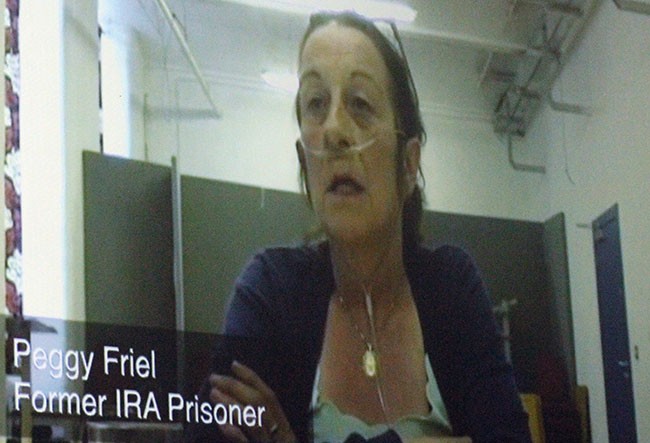
• Former POW Peggy Friel (who has since passed away) outlines the brutality she and her women comrades faced in jail
Needs to be told
Summarising the night, Séanna Walsh said:
“It is Coiste’s intention to hold similar launches throughout the country to ensure that the protesting prisoners, their families and friends are aware of the work that has been done so far and our plans to hold the British state accountable for the torture of prisoners in the H-Blocks and Armagh Prison.”
‘Blanketman’ Seamus Finucane put the event in context when he told An Phoblacht it was:
“A powerful presentation which will influence the narrative of the conflict in the forthcoming consultation process on how we deal with legacy of the British/Irish war.
“Systemic human rights abuses were carried out by the prison administration as part of Britain’s counter-insurgency policy.
“The truth needs to be told at home and abroad.”
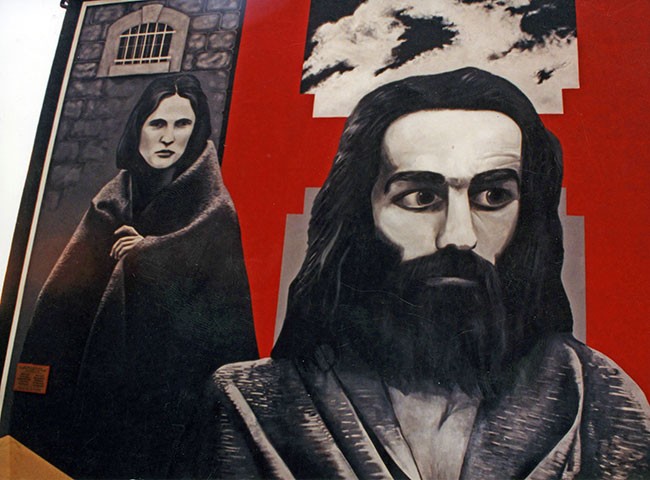
‘Abuse akin to rape’
PROTESTING prisoners who refused to comply with searches saw half a dozen prison guards grab the naked prisoner by his arms and twist them behind his back, forcing him to bend over.
Any resistance was met with repeated punches to the stomach, forcing the prisoner to double up.
Prison officers standing behind the prisoner would kick the prisoner behind the knees, causing him to collapse over the mirror which was about 12 inches by 10 inches and fitted into a bed of foam.
A prison officer would insert his fingers into the prisoner’s anus. Some prisoners have given statements accusing those involved in the search of using such force as to have left them bleeding from torn skin tissue.
It wasn’t unusual for the prison officer carrying out the anal search to then force his fingers into the prisoner’s mouth under the guise of a further search.
The process was often accompanied by crude sexual commentary from those in the search team.
Clinical psychiatrist Dr Oscar Daly expressed his view to the tribunal that “the excessive and unjustified use of mirror searches could potentially constitute an abuse to prisoners akin to rape”.
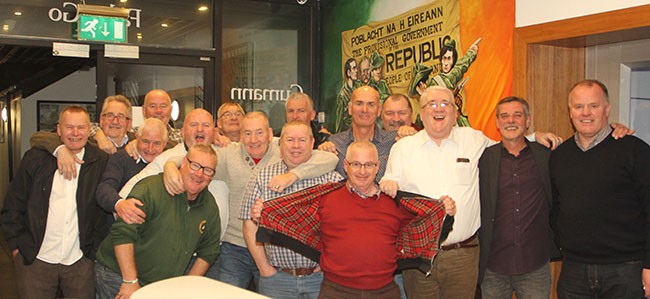
• Some of those who attended the launch: Gerry Moore (Derry), Michael Culbert, Director of Coiste (Belfast), Pius McNaught (Derry), Seamus Brown (Derry), Peter McGowan (Derry), Peadar Whelan (Derry), Liam Whelan (Derry), John Devine (Belfast), Charmaine Pickering ( whose brother John was on the H-Blocks Hunger Strike in 1981), Liam Friel (Derry), Jim McCann (Belfast), Antoin de Brún (Derry), Kevin Quigley (Derry), Frankie Doherty (Derry), John Hunter (Belfast), and Eamonn O’Donnell (Derry)




